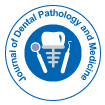开放获取期刊获得更多读者和引用
700 种期刊 和 15,000,000 名读者 每份期刊 获得 25,000 多名读者
抽象的
Oral Care Resilience in the Face of a Pandemic: Impact on Depression and Burning Mouth Syndrome
Paul Harris
The COVID-19 pandemic has posed unprecedented challenges to individuals' physical and mental well-being, shedding light on the intricate connections between oral care, depression, and Burning Mouth Syndrome (BMS). This abstract explores the profound implications of oral care resilience in the context of a pandemic and its direct influence on depression and BMS. As stress and isolation have become prevalent during these times, they have, in turn, contributed to an increase in depression rates. Such emotional distress, coupled with poor oral hygiene practices, can exacerbate oral health issues and potentially lead to the development or worsening of BMS.
This abstract highlights the critical role of consistent oral hygiene practices, effective stress management techniques, and the importance of seeking professional help in building resilience against these challenges. Through a comprehensive understanding of the interplay between oral care, mental health, and BMS, individuals and healthcare providers can work together to mitigate the impact of the pandemic on depression and BMS, fostering overall well-being. This article serves as a reminder that during times of crisis, oral care should not be overlooked, as it plays a pivotal role in the broader landscape of health and resilience. Frailty, disability, sarcopenia, care dependency, and limited access to professional oral healthcare can also compromise the oral health of older people. To prevent rapid oral health deterioration, a comprehensive approach is required that involves effective communication between oral healthcare providers, other healthcare providers, and informal caregivers. Oral healthcare providers have a responsibility to advocate for the importance of maintaining adequate oral health and to raise awareness of the serious consequences of weakened oral health. By doing so, we can prevent weakened oral health from becoming a geriatric syndrome.

 English
English  Spanish
Spanish  Russian
Russian  German
German  French
French  Japanese
Japanese  Portuguese
Portuguese  Hindi
Hindi